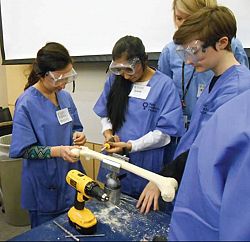Judge Memorial CHS girls gain confidence in continuing with science, engineering education
Friday, Feb. 19, 2016
 + Enlarge
+ Enlarge
During the Perry Outreach Initiative, Judge Memorial students participate in the hands-on curriculum from the orthopedic surgery instruction: breaking, sawing and drilling bones, and doing biomedical engineering. The coursework is designed to bridge the gap between bioscience and engineering and reinforce cross-cutting concepts in math and science.Courtesy photo
SALT LAKE CITY — Twenty Judge Memorial Catholic High School girls were selected to experience a full day of hands-on science Feb. 6 in the University of Utah Perry Outreach Initiative for high school students in Salt Lake City.
The Perry Initiative runs over 40 day-long outreach programs nationwide, reaching over 1,000 high school, college, and medical students to encourage young women to enter the fields of engineering and orthopedic surgery.
The application process for the JMCHS students was coordinated by Dr. Dasch Houdeshel and his colleagues in the JMCHS science department.
The University of Utah science lab focused on attracting female high school students into the sciences for college. Those in grades 10 and up interested in exploring careers in orthopedics or engineering participated in six hands-on mock surgical exercises, and learned from local women surgeons and engineers.
The students were led by Dr. Kristen Carroll and Dr. Angela Wang, both orthopedic surgeons in Salt Lake City, who talked about the importance of mentoring, working as a team and supporting each other.
JMCHS seniors Loveleen Ghuman, Miranda Rougelot, Mira Thompson, Maliha Masud and Jasmine Masih collectively said in an interview that the experience inspired them to go into medicine or engineering without fear.
“A doctor’s office should be like a community; I liked that,” said Thompson.
The students were inspired to “believe in themselves” and encouraged that they would be able to “balance a career and also have a family.”
The five students were humbled by the expertise and knowledge of the doctors, they said, and learned “you don’t have to be one of the guys to be a successful surgeon,” said Masih. “It’s OK to ask for help.”
A point Thompson learned was that doctors have to be creative on the spot to solve problems; they learn how to mend bones and wounds over and over before actually going into surgery, and then in surgery a person’s bone could be a tiny bit different from what they learned, she said.
During the hands-on lab experiences, the students broke, drilled and sawed real bones, which “I thought I was going to be too weak to do, but it was fun,” said Masud.
“It was so realistic,” said Rougelot.
Ghuman was surprised to see how doctors and engineers work together, she said. “Before I thought engineering and medicine were separate fields, it was interesting seeing them come together.”
Rougelot became interested in orthopedics after recovering from many gymnastic injuries, she said. A video of a gymnast with a prosthetic leg stood out for her. “It was inspiring to see that orthopedics can change someone’s life so they can continue to do what they love,” she said.
The students were impressed that the doctors were humble and not materialistic, they said.
“The doctors said ‘It’s a privilege to help people,’” said Masud.
The students are considering medical school; Masih wants to be a surgeon, she said. “Getting the hands-on experience confirmed I do want to go into medicine to save lives,” she added.
Masud’s father is a doctor and her role model; she plans to go into pediatrics, she said. “Seeing the women in this experience gave me people to look up to. The experience was empowering.”
The thought of going to medical school was frightening for Thompson until she attended the Perry Initiative, “but seeing the women in these professions made it seem possible for me; doing the hands-on experience was so much fun,” she said.
Ghuman felt “capable and qualified” and realized she didn’t have to be the valedictorian to go into the field of medicine, she said.
Rougelot found courage in the lab science; “we lifted each other up and it was a good experience,” she said.
For questions, comments or to report inaccuracies on the website, please CLICK HERE.
© Copyright 2024 The Diocese of Salt Lake City. All rights reserved.
© Copyright 2024 The Diocese of Salt Lake City. All rights reserved.

Stay Connected With Us